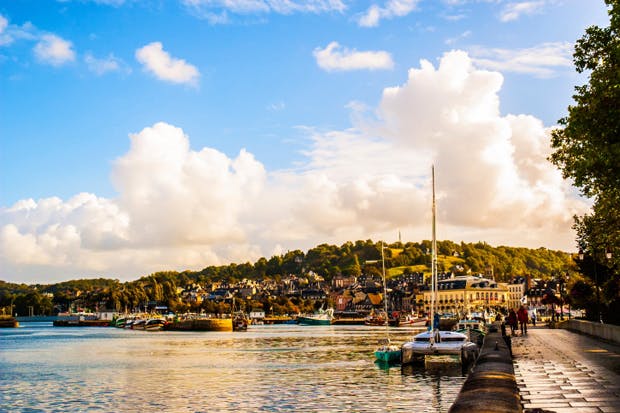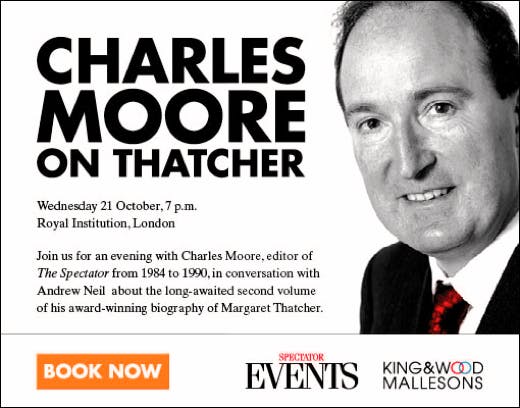Obviously when one attends what the papers call ‘cocaine-fuelled orgies’, one expects to find several members of the peerage present, but I must confess that until all this trouble, I had not heard of Lord Sewel, beyond a vague apprehension that he was a misprint rather than a person. I now discover that he is a Blair peer — a specially ignominious category, rather like Lloyd George’s creations. But I still worry that he has ‘resigned’ from the House of Lords. If we continue to think that our second chamber should be unelected, it should be all but impossible to get rid of a peer once appointed. Otherwise, politics being what it is, the powerful will constantly try to assail and discredit members of the Lords in order, by frightening them, to reduce their independence. The point — contained in the word ‘peer’ — is that all Lords are equals and they should be able to extrude one of their number only by their own processes and only with the greatest difficulty. Clearly Lord Sewel is right to retire from the scene and make more room for his leisure activities (‘hill walking, skiing; watching cricket’, according to Who’s Who), but the net result of his disgrace will be not a cleaner House of Lords but an even weaker one.
We have just returned from our first cruise. Hillsdale College in Michigan — coeducational from its foundation in 1844 — is a bastion of conservative education in the United States (‘Pursuing truth; defending liberty’). Its supporters come on cruises, and are lectured by people like me on improving subjects like Margaret Thatcher. We began in Lisbon, and worked our way up the Atlantic coast, visiting Oporto, St Jean de Luz, Bordeaux, the Normandy beaches. I had slightly dreaded it because of the fear of being cooped up, but I now understand why people like cruises. There is no worry about luggage, hotel bookings, bureaucracy or means of travel. We didn’t have to show anyone our passports in nearly two weeks. You arrive at each new port comfortably, and you usually see it at its best — the beautiful marshes on the banks of the Garonne, the fortress at St Malo, the great mouth of the Seine at Honfleur. The approach by water makes you understand why these places exist.
I had not been to Honfleur since 1972 when, one cold spring, a school friend and I drove our mopeds there. We were so poor that we ate in a restaurant only once in the whole trip, choosing a modest place away from the town’s main tourist attractions. At the table next to us, a man eating alone ordered a bottle of cider and left having drunk only half of it. We could not believe that anyone could be so rich as to do this, and incited one another to take what remained of the bottle, but didn’t dare. My companion’s name was George Robinson. Today he appears in the Sunday Times Rich List, where it alleges that he earns enough each year to buy himself 20 million bottles of cider. Sadly, I have not achieved this happy state, but my wife and I ordered cider, and dashingly left half of it.
While we were away, David Cameron made his strong speech about Islamist extremism, and how its religious character (however much it may distort the faith) should not be shirked. In Britain, we have had, until recently, so little direct experience of this conflict with Christendom that it is not much part of our folk memory, but in the Iberian peninsula the idea of what Mr Cameron calls an ‘existential threat’ is old and deep. We saw two depictions in churches in Oporto of the beheading of Franciscan friars by turbaned Moors. It was a shock to sense that what would until recently have seemed thankfully out of date, now felt contemporary. In Bento station, in the same city, handsome azulejos murals, a century old, depict the conquest of Ceuta in 1415 by King John of Portugal and his son Prince Henry the Navigator, before whom the Moors throw down their arms and beg for mercy. One wonders how long before such a scene is removed for being Islamophobic, and how long after that before it is re-enacted, in reverse.
On board our ship, the Crystal Serenity, every effort was made to look after us courteously. Modern standards, however, put things under some strain. As our voyage neared its end, the daily ship newspaper, Reflections, delivered to the door of our cabin (‘stateroom’), said: ‘All guests are cordially invited to join Captain Birger J. Vorland and Crystal Society Hostess Isabell Wagner in the Palm Court at 7:45 p.m. While the Captain is pleased to meet you, he and the other staff receiving you refrain from shaking hands in order to provide the most effective preventative sanitary measures.’
We return to find the Financial Times sold to Japanese and Jeremy Corbyn threatening to take over the Labour party. The press keep referring to the FT as ‘the Pink ’Un’. It was never called that. The Pink ’Un’s formal name was the Sporting Times, and the paper existed from 1865 to 1932. Its annuals were actually called the Pink ’Un. In addition to racing, it carried gossip, theatre coverage and, unlike the FT, general merriment. It was the Pink ’Un that printed the famous obituary of English cricket which gave rise to the joke behind the Ashes.
Mr Corbyn has a beard. If he becomes leader, he will be the first bearded leader of any main party since Keir Hardie. The beard as a fashion item is now back, generally in shaped and even waxed form. But Mr Corbyn’s one owes nothing to fashion. It is a 1960s political beard, already obsolete when he first brought it into the House of Commons in 1983. Like Lord Hailsham who, as Mrs Thatcher’s Lord Chancellor, continued to wear a bowler hat long after it had disappeared from everything but hunt puppy shows, Orange parades and A Clockwork Orange, Mr Corbyn is undaunted by the passage of time. I must try not to get sentimental about him.
Got something to add? Join the discussion and comment below.
Get 10 issues for just $10
Subscribe to The Spectator Australia today for the next 10 magazine issues, plus full online access, for just $10.
















Comments
Don't miss out
Join the conversation with other Spectator Australia readers. Subscribe to leave a comment.
SUBSCRIBEAlready a subscriber? Log in